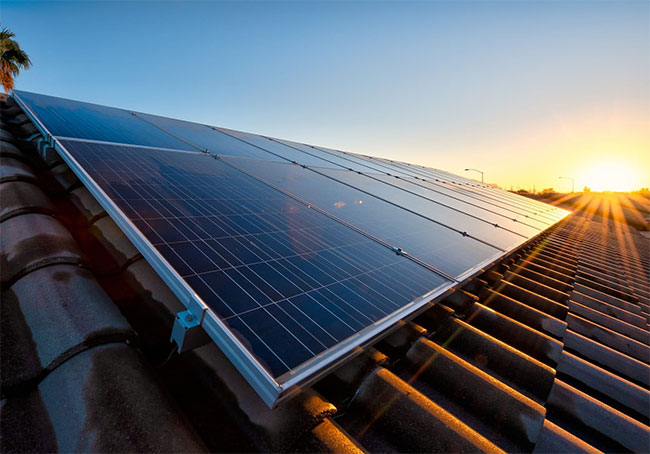CEB issues another notice to rooftop solar system owners
April 15, 2025 05:39 pm
The Ceylon Electricity Board (CEB) has reiterated that owners of rooftop solar systems must switch off their units until 03.00 p.m. on a daily basis until 21 April if they receive an SMS from the board.
The CEB noted that such measures are taken when there is a risk of grid instability, owing to the significant reduction in demand during the New Year holiday period.
After a detailed study on the forecast demand for electricity during the April holidays and the operational renewable energy supplies, the CEB decided that the supply of electricity would need to be managed during the April holidays, the board said in a statement.
The statement went on to say, “At any given moment, electricity production should exactly match the consumption. If customers are not using much electricity or have closed down, electricity production, too, has to be reduced. On Sundays and national holidays, the customer demand is very low, and therefore, electricity supply too, must be reduced.”
“On Thursday, 10th April from 1500hrs onwards, supply from rooftop units of 100kW and above, operating on net plus and net plus plus contracts, were shut down. These units, numbering about 500, supply energy to the grid on a commercial basis. In line with standard operational practices during periods of low demand, similar to other CEB and privately-owned power plants, these units remain offline throughout the holiday period to support grid stability. The vast majority of 100,000 customers have solar units smaller than 100 kW and consume some of its production at the same location.
“On Friday, April 11th, as some factories were still working, the morning demand was met initially with the support of three coal generating units. Later during the day, all three coal units were backed off to their minimum power levels to accommodate solar generation from about 100,000 smaller solar units during daytime. The daytime peak demand was successfully met using a diverse energy mix of hydro, coal, naphtha, wind, solar, and mini hydro sources. As the night-time demand sharply declined, signaling that the holiday season has commenced, one coal unit was completely shut down at 21:57.
“Although rooftop solar units, which collectively exceed 1,500 MW in capacity, are not directly visible to the System Control Centre (SCC), the recorded overall demand during most of the daytime remained above 1,500 MW. This suggests a significant contribution from rooftop solar units. Additionally, large synchronous generators played a vital role in maintaining system inertia, ensuring grid stability throughout the day.
“On Saturday, April 12th, with factories and offices shut down, electricity demand dropped sharply as expected. The demand at 6 am, before any solar units commenced production, was lower by about 400 MW compared with a typical Saturday. The only remaining oil power plant that was helping overnight in the absence of one coal unit, the Kelanitissa power plant using Naphtha from the refinery, was fully shut down by 09:16 AM to accommodate the production from solar units. No oil-fired power plants operated the rest of daytime. Only two coal units operating at minimum power and larger hydro power plants maintained grid stability. CEB prioritized renewables, allowing all small solar units to produce, but as a precaution, issued SMS alerts to all rooftop solar owners to support grid management. The night peak was met using hydropower and ramped-up coal power from the two coal units that were still in operation. Shutting down another coal unit would have risked meeting night-time customer demand and inertia.
“On Sunday, April 13th, the demand fell further as shops and other commercial customers, too, closed down, increasing grid stability challenges. CEB again issued a public request to all rooftop solar unit owners, including smaller units, to temporarily shut down during the day. Only two coal units at minimum production operated during daytime to accommodate solar power—no oil-fired power plants were used. Throughout this period, only two coal units, operating at minimum power at daytime to enable solar power to be absorbed, but operating at almost full power overnight to serve the customer demand, were active. Oil-fired generation was used briefly during night peaks, when the other renewables (wind and biomass) and hydropower alone could not meet the demand.”
In conclusion, CEB Media Spokesman Dhammike Wimalaratne said the board continuously reviews the supply-demand situation, and when there is a risk of grid instability, a request will be made from owners of rooftop solar systems to shut down their units.
Therefore, the CEB Spokesman requested relevant parties to support the initiatives taken by the board until 21 April.












